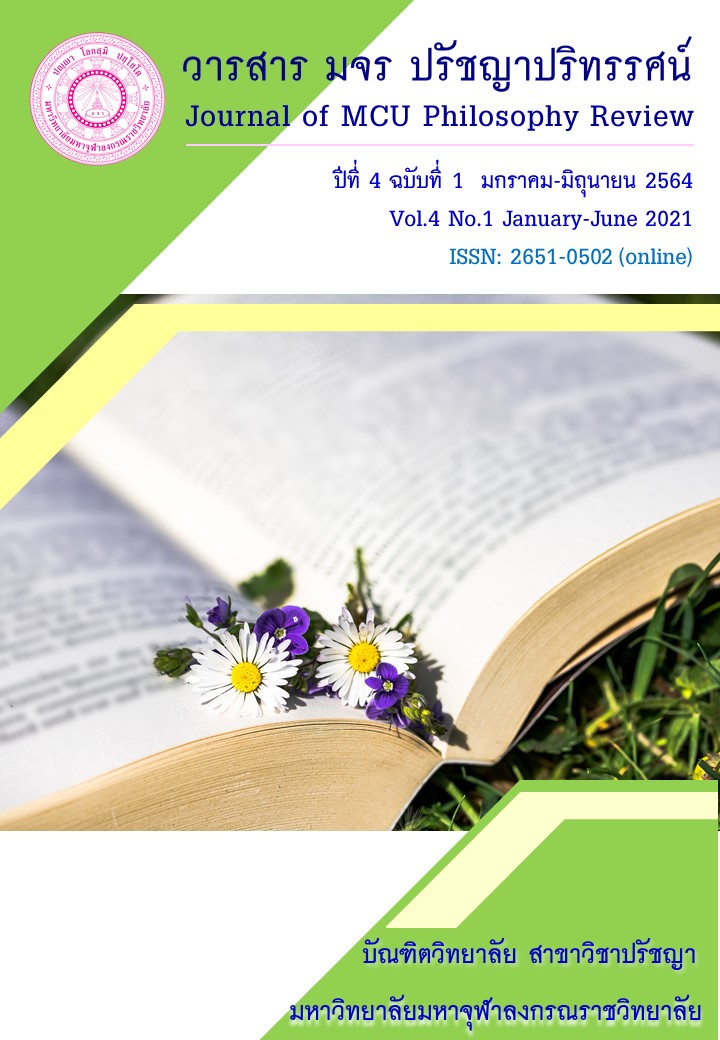Thomas Hobbes' Nature of Man in the View of Theravada Buddhist Philosophy
Main Article Content
Abstract
In this research, the main objective was purposely made to critically analyze Thomas Hobbes’ nature of man in the viewpoint of Theravada Buddhist philosophy. This is documentary research. In the study, it was clearly found that according to Thomas Hobbes’s viewpoint, the selfishness is the real nature of man. Since man possesses such selfishness then it comes to determine man’s behavior in the way that he/he seeks for his/her own benefit only. It is strongly claimed that the nature in trying to look for the advantage for himself or herself becomes the most essential motivation of the nature of man. Based on this motivation, the conflict would be precipitated while seeking for one’s own benefit. In order to solve this problem, Hobbes proposed the social contract theory whereby the conflict caused by individual’s seeking for himself or herself benefit based on the nature of selfishness would be somehow solved. In this respect, it is argued by Theravada Buddhist philosophy that in the state of nature man is purely born, to wit, man is neither good nor bad in some ways despite possessing the innate nature of wholesome and unwholesome. By virtue of this state, man is not originally endowed with the selfishness. What Buddhist philosophy holds to be the thing man should do is the cultivation of nature of wholesome, loving kindness, for instance, to higher level than the unwholesome one where it could prevent the taking place of the conflict caused by individual’s seeking for his/her own benefit. Since the nature of wholesome has been perfectly developed then the nature of unwholesome would not be able to get the opportunity to determine man’s behavior. The motivation to develop the wholesome is regarded as the most essential condition in the nature of man according to Theravada Buddhist philosophy.
Article Details
บทความที่ได้รับการตีพิมพ์เป็นลิขสิทธิ์ของวารสาร มจร ปรัชญาปริทรรศน์
ข้อความในบทความที่ได้รับการตีพิมพ์ในวารสาร ถือเป็นความรับผิดชอบของผู้เขียนบทความ และข้อคิดเห็นนั้นไม่ถือว่าเป็นทัศนะและความรับผิดชอบของกองบรรณาธิการวารสาร มจร ปรัชญาปริทรรศน์
References
พระมหาอุทัย ญาณธโร. (2538). พุทธวิถีแห่งสังคม. กรุงเทพมหานคร : สำนักพิมพ์ธรรมสาร.
พระศรีคัมภีรญาณ. (2556). พุทธปรัชญา. พระนครศรีอยุธยา: โรงพิมพ์มหาจุฬาลงกรณราชวิทยาลัย.
มหาจุฬาลงกรณราชวิทยาลัย. (2513). พระไตรปิฎกภาษาบาลีฉบับสยามรัฐ. กรุงเทพมหานคร: โรงพิมพ์การศาสนา.
มหาจุฬาลงกรณราชวิทยาลัย. (2539). พระไตรปิฎกภาษาไทย ฉบับมหาจุฬาลงกรณราชวิทยาลัย. กรุงเทพมหานคร: โรงพิมพ์มหาจุฬาลงกรณราชวิทยาลัย.
มหามกุฏราชวิทยาลัย. (2525). พระไตรปิฏกพร้อมอรรถกถา แปล. ชุด 91 เล่ม. กรุงเทพมหานคร: โรงพิมพ์มหามกุฏราชวิทยาลัย.
มหามกุฏราชวิทยาลัย. (2547-2551). พระธัมมปทัฏฐกถาแปล ภาค 1-8. กรุงเทพฯ : โรงพิมพ์มหามกุฏราชวิทยาลัย.
สุเชาว์ พลอยชุม, สุวิญ รักสัตย์. (ม.ป.ป). พุทธปรัชญา. พิมพ์ครั้งที่ 1. มหามกุฎราชวิทยาลัย : นครปฐม.
Leo Strauss. (1965). Natural Right and History. Chicaco: University of Chicago Press.
Thomas Hobbes. (1967). “Leviathan or the Matter”. Form and power of a Commonwealth Ecclesiastical and Civil. edited by Michael Oakeshott with an introduction by Richard S. Peter, New York: Collier Books.


